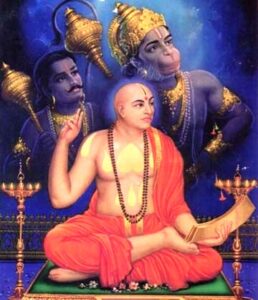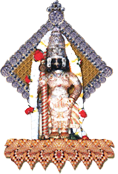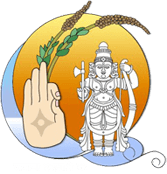
Srimad Ananda Teertha, also known as Poornaprajna and Madhvacharya, is the propagator of the doctrine of Tattvavada. He is the last of the great Acharyas of Vedanta, and is also the 22nd commentator on the Brahma-Sûtra of Veda Vyasa.
His doctrine asserts that the differences are eternally real, and that hence there is more than one absolute real, and that Hari (Vishnu) is the only entity praised in the Shrutis and their adjuncts. Thus, he always identifies the Brahman of the Upanishads with Vishnu, and forcefully argues against the dichotomy of Shrutis (tattvaavedaka / atattvaavedaka) as claimed by Sri Sankaracharya, saying that such arbitration of apaurusheya scripture is unacceptable both logically and spiritually. He also emphasizes that it is important to understand and specifically reject other schools’ precepts, and hence devotes much time to nitpicking analyses and denunciations of other doctrines.
Srimad Ananda Teertha is commonly identified with Madhva, the third avataara of Mukhya PraaNa, the god of life, as given in the BaLittha Sukta of the Rig Veda. The first two avatara-s are as Hanuman and Bheemasena, and the third is Madhva, who came down to Earth as a sanyasi.
Srimad Ananda Teertha himself makes the claim to being Madhva in several instances, one of which is in the Vishnu-tattva-vinirnaya. It was recognized in his own time, and it has been documented, that he had all thirty-two shubha-lakshaNa-s that define a ruju-taattvika-yogi, including the prescribed height of ninety-six inches (“shaNNavati angulo.apetam”) quoted in the Mahabharata-Tatparya-Nirnaya.
However, he is firmly set against the notion of accepting doctrines because they come from prophets or claimed gods. He also dismisses claims that only part of the Vedas are useful, and claims that even the so-called karma-kaNDa portions of them are only meant to worship Hari.
Sumadhvavijaya is a biographical account of Acharya Madhva composed by Sri Narayana Panditacharya, the son of Sri Trivikrama Panditacharya, who was a contemporary of Acharya Madhva. The generally accepted dates for Madhva are 1238-1317 CE (AD), while those for Narayana Panditacharya are 1295-1370 CE. It is very likely that the young Narayana was associated with many of the events covered in detailed descriptions of Acharya Madhva’s life.
Dr. B.N.K. Sharma says “Madhva’s biography, unlike others of its kind, has a perfect historical perspective and never indulges in anachronisms and episodes of a compromising nature to the subject. We get a pen-picture of Madhva saying that he had all the maha purusha lakshana-s. Madhva was a great sportsman, and also a good wrestler, mountaineer, etc. The early incidents of digesting horsegram as a baby still on mother’s milk, eating thousands of plantains and drinking pots of milk as a young lad, and eating all the food offered by several hosts in Badarinath, as well as keeping a complete fast with total silence for 48 days in that extremely cold and difficult place before going to meet Sri Veda Vyasa – all portray Madhva as one who was not an ordinary person dependent on food.”
Similarly, Madhva is said to have shown that God is present everywhere, even as a toddler of two years, by his actions in visiting the temples. The attachment of his parents to the beautiful child, and their sorrow when he renounced the world at the young age of eight years, are poignant, but Madhva maintains his dignity and conviction without hurting them.
Note: The first fourteen sarga-s of Sumadhvavijaya were translated to English and coded by Sri Raghavendra Rachuri. The last two were added by Sri Krishna Kadiri. Smt Meera Tadipatri and Sri Anand Ravipati read the proofs.
Invocation:
kAntAya kalyANa guNaikadhAmnE navadhyunAthapratimaprabhAya
nArAyaNAya akhila kAraNAya shrI prANanAthAya namaskarOmi
I offer my obeisance to Lord Narayana, with the most delightful personality, who is the unique primal fountain head and embodiment of countless auspicious qualities like Jnana, Ananda etc, who is the creator of the world of living souls and inert matter, who has the effulgence of the just rising Sun, who is the Lord of Mahalakshmi, and Mukhya Prana, who controls the life force of all living beings.
anAkulam gOkulamullalAsa yatpAlitam nityamanAvilAtma
tasmai namO nIradanIlabhAsE kRuShNAya kRuShNAramaNa priyAya
I offer my obeisance to Krishna who has the luster of dark rain-bearing clouds and is very dear to the husband(s) of Draupadi (called Krishnaa). Krishna also protected from danger or destruction, the cow herds of Gokula from enemies.
mukunda bhaktyai gurubhaktijAyai satAm prasatyE cha nirantarAyai
garIyasIm vishvagurOrvishuddhAm vakShyAmi vAyOravatAralIlAm
Devotion to God (Mukunda) will arise only with devotion to the preceptor (Guru). Hence, for securing the grace of God for the good people through devotion, I will describe the great, pure Avataaraleela of Sri Vayu, who is the great preceptor of the entire world.
– compiled by Balachandra Achar Hejamady
List of chapters :


